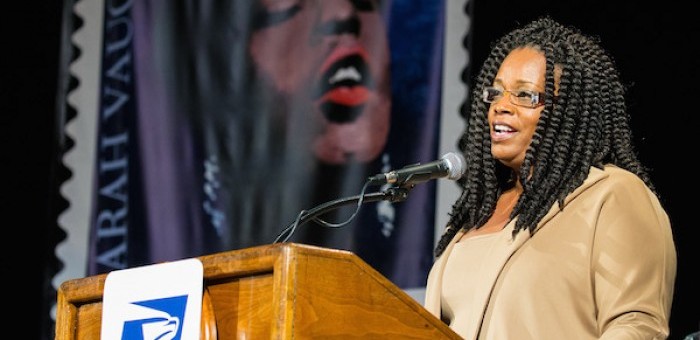Jan 13, 2026 2:09 PM
More Trump-Kennedy Center Cancellations
The fallout from the renaming of the John F. Kennedy Center for the Performing Arts to include President Donald…

Sarah Vaughan is still packing them in—based, at least, on the crowd drawn to Newark Symphony Hall, where, on March 29 in the heart of New Jersey’s largest city, some 2,500 people saw the unveiling of a stamp honoring the singer as part of the United States Postal Service’s music icon series.
Vaughan, who died in 1990 at 66, became the seventh artist so honored.
Though philately played a role in the event—collectors lined up to buy the stamp, an artist’s multicolored rendering of a photo—most of the people in the Sarah Vaughan Concert Hall were there to revel in the musical life and times of the NEA Jazz Master and Newark native, whose cultural legacy clearly lives on.
They were not disappointed. Vocalist Dianne Reeves, scheduled for a non-singing appearance at the ceremony a day before she played Carnegie Hall, related a backstage encounter in which, as a young singer, she once found herself extolling the virtues of “Sarah Vaughan” to Vaughan herself, whom she had not recognized.
As Reeves told it, she sidled up to Vaughan, who, sitting alone on a couch, responded when Reeves declared she was a singer, too. “She said, ‘Who do you listen to?’ I said, ‘Sarah Vaughan.’ She said, ‘Really.’” The story conjured up Vaughan at her most bemused, drawing knowing laughs—not least from her friends and family seated in the front rows.
But it was an unexpected vocal turn, in which Reeves rendered a cappella an excerpt from Vaughan’s 1947 hit “Tenderly” that brought down the house. With its swooping highs and lows, Reeves’ take on the sentimental ballad, fragmentary though it was, recalled the improbably wide vocal and emotional range of a Vaughan performance.
Melba Moore, a Tony winner, swung her way through “Broken Hearted Melody.” She then offered a languid “Misty,” an early Vaughan signature song, while Carrie Jackson, a Vaughan specialist, took on the tune that knocked “Misty” off its perch: “Send In The Clowns.” Jackson touched on, but did not luxuriate in, the sumptuous rubato for which Vaughan’s interpretation was known.
Both Moore and Jackson are Newark natives, and Vaughan’s ties to the city were a running theme, one highlighted most pointedly with a stirring performance of “Lift Every Voice And Sing” by the black-garbed choir from Mt. Zion Baptist Church, Vaughan’s old congregation.
The offering lifted audience members out of their seats, turning the concert hall into a kind of church auditorium.
In an interview, Jackson, who has been presenting sets dedicated to Vaughan in New Jersey clubs for the past 15 years—and in 2013 produced the album A Tribute To Sarah Vaughan, Newark’s Own—noted that she shared roots with Vaughan in the gospel choirs of Newark’s Baptist churches, where Vaughan first shaped her singularly deep and dramatic tones.
“There was a certain thing in her voice I heard,” Jackson said. “It reaches into your soul.”
Jackson’s reaction was hardly unique. In a separate interview, Junius Williams, the chairman of Newark Celebration 350 and a well-known civil-rights leader, said Vaughan’s impact on aspiring singers was global.
“She was a role model for people coming from so many places like Newark,” Williams said. “For the young people coming along then, she was one of the icons to look up to.”
Echoing that point in a formal proclamation was Newark Mayor Ras Baraka, the son of Amiri Baraka, the Newark poet whose written cadences were often compared to those of a jazz musician. Affirming it further was Deputy Postmaster General Ron Stroman, a graduate of Rutgers School of Law in Newark, who, in dedicating the stamp, recalled hearing Vaughan for the first time, at Newport in New York 1972.
“She unfurled every note,” he said, referring to a rendition of “Poor Butterfly.” “I became caught up in that web of beauty.”
In the years before the civil unrest in Newark in 1967—and even to some degree after—the city’s jazz scene thrived. At scores of venues like the Key Club, Sparky J’s and, indeed, Symphony Hall—once known as the Mosque—Newark nurtured giants of the music spanning much of its history, from Willie “The Lion” Smith to Wayne Shorter.
But none stood taller—or epitomized the city’s jazz history better—than Vaughan.
“Sarah Vaughan stands for what Newark is and was to so many people,” Williams said. “And Newark was a jazz capital of the world.”
—Phillip Lutz

Belá Fleck during an interview with Fredrika Whitfield on CNN.
Jan 13, 2026 2:09 PM
The fallout from the renaming of the John F. Kennedy Center for the Performing Arts to include President Donald…

Peplowski first came to prominence in legacy swing bands, including the final iteration of the Benny Goodman Orchestra, before beginning a solo career in the late 1980s.
Feb 3, 2026 12:10 AM
Ken Peplowski, a clarinetist and tenor saxophonist who straddled the worlds of traditional and modern jazz, died Feb. 2…

The success of Oregon’s first album, 1971’s Music Of Another Present Era, allowed Towner to establish a solo career.
Jan 19, 2026 5:02 PM
Ralph Towner, a guitarist and composer who blended multiple genres, including jazz — and throughout them all remained…

Rico’s Anti-Microbial Instrument Swab
Jan 19, 2026 2:48 PM
With this year’s NAMM Show right around the corner, we can look forward to plenty of new and innovative instruments…

Richie Beirach was particularly renowned for his approach to chromatic harmony, which he used to improvise reharmonizations of originals and standards.
Jan 27, 2026 11:19 AM
Richie Beirach, a pianist and composer who channeled a knowledge of modern classical music into his jazz practice,…